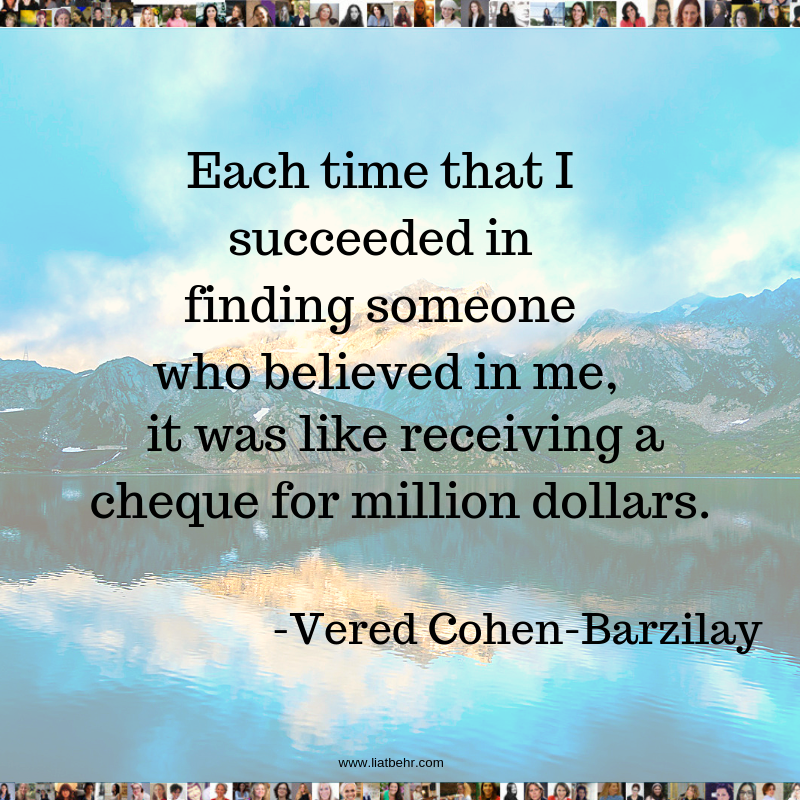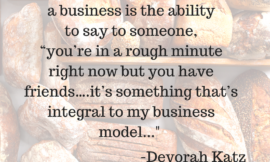Vered Cohen-Barzilay defies categories. It is impossible to neatly define Vered and what she does because she develops so many rich and complex ideas. But Vered’s journey has been fraught with extreme pain which she shares here for the first time.
I face a paradox in attempting to define Vered Cohen-Barzilay and her work. On the one hand, she defies categories. Like the name of one of her educational initiatives, she is Out of the Box, a creative, non-conformist thinker whose work spans so many types of initiatives it is difficult to neatly define them. On the other, in order to share them I must define them.
I am left with the choice of an insufficient compromise. Defining Vered and her work but informing the reader that my words paint an incomplete picture and that there is so much more to Vered and her initiatives than I can explain in this post.
Social and Educational Innovation
Vered Cohen-Barzilay is an innovative social and educational entrepreneur, publicist and feminist activist. Her projects, fresh, deep and complex, do not always catch on quickly because they are not quick-fix answers to societal ills. Though they are immediately impactful, their profound effects can in fact take time to be seen.
Some of Vered projects include:
The Renaissance Children
A unique learning program that helps spark independence in students while providing them with the ability to learn STEAM subjects (STEM = STEM + Art) independently.
High School Science Accelerator
Promotes STEM studies for girls and boys. As part of the program, students met with Eugene Tu from Nasa.
Women’s Media Center
Vered’s comprehensive response to the problem of the lack of representation and diversity women face in Israeli media.
Novel Rights
A global literary human rights movement that utilizes the power of literature to drive change. Most recently it facilitated a meeting between Iraqi and Israeli authors in Berlin.
MENA
Vered is the founding coordinator of this network of authors and poets in the Middle East and North Africa, established to provide authors with support for their writings, create a community and support authors at risk.
What’s so incredible is that this is just a very partial list of Vered’s initiatives.
Vered’s accomplishments are extensive and cannot be taken for granted. Hers is not just a gifted brain working overtime. Rather, her initiatives may be seen as something that has roots in experiences deep in her past.
Pain as an Engine for Growth
Vered’s educational projects go beyond the understanding that the internet has changed and that as a result, so has the educational needs of students. In fact, they can be seen as developing from a very personal place.
As a four year old Vered taught herself to read and write though constantly being discouraged to do so. Later, as a six or seven year old, when a friend was in jeopardy of being held back in grade one, Vered took it upon herself to help her pass. “I can do it. I taught myself. I have methods,” she remembers convincing her friend’s mother. For the entire summer, with incredible determination and her own teaching methods, Vered taught her friend to read and write well so that she passed the required test that unlocked the door to grade two.
But, Vered tells me, “there were many situations in my life where people were angry with me for being different or for trying to give an original point of view.” It’s these situations that caused her to feel that she was doing something wrong, though she couldn’t figure out what. Being gifted, highly creative and a thinker may seem like assets in today’s entrepreneurial climate. But in the early ‘80s these were liabilities. And worse than causing others – both teachers and peers – to think that she’s a freak, is that Vered saw herself as one.
Making things even worse, was her family’s financial collapse. Though a talented accountant who was brilliant with numbers, Vered’s father failed as businessman. Falling into debt with no ability to pay his creditors, the electric company cut their electricity, they had no phone and the only thing for Vered to eat was bread and mayonnaise. As if that’s not bad enough, there is state-warranted debt-collection in Israel, whereby government-funded thugs can legally come in to your home and take anything they see fit. When there was nothing else to take, they took Vered’s mother’s Kabbalistic book, which she held sacred.
I asked Vered what kept her going through this excruciating time.
There are two things:
1. “Each time that I succeeded in finding someone who believed in me, it was like receiving a cheque for million dollars.”
2. “I always believed inside that even though this was the reality, it is not the way it was meant to be and that I have the ability to change it.”
Today, another project Vered would love to take is to protect children who are going through their own family’s financial collapse. It shouldn’t be ok to go into a child’s home. “In the eyes of a child, her home is her fortress,” she says. Debt collectors should not be able to go into any home without having a psychologist present, or having previously taken out the child so that she won’t see her parents collapsing. It leaves terrible scars.
The Importance of Strong Female Role Models
Considering all the pain Vered experienced when she was still young, circumstances could have led her to give up before she ever got started. She saw her father financially collapse and become a recluse at home with no way to climb out of his debt or his misery.
Perhaps surprisingly, it was Vered’s mother who turned the situation around, having her own mother (Vered’s grandmother) as role model when her life became unbearably difficult.
“My grandmother came from a very rich home in Turkey,” Vered explains, “…her father was an advisor to the Turkish Sultan. But even so, they came to Israel without money. They left the money and prestige in Turkey.” After arriving in Israel, Vered’s grandmother became a widow with four young children. “So my mother grew up in poverty. But then, everyone was poor…And there was also a support system.”
As you can imagine, growing up as the daughter of the advisor of the Sultan, Vered’s grandmother grew up spoiled and that is how she acted. “Even when she didn’t have money, she always acted like had a ton,” Vered tells. “And then, even before her husband died of cancer, she had to support her family. And so she cleaned an event hall. And slowly, with her hard work and charm, she eventually became the manager of the hall.”
Vered’s mother on the other hand, did not work. In fact, her husband didn’t allow her to work, thinking he was protecting her, or perhaps more importantly his honor – his ability to provide for his wife.
After her family’s financial collapse, Vered prodded her mother to go out to work. And she did. Eventually making enough money to pay off her husband’s debts. Vered saw her mother gain not only her independence, but also her strength. Only when her mother had these was she able to really save her family, pulling them out of financial ruin.
Today, Vered continues to push her projects forward while innovating new projects, some of which she hopes to will help provide women with the ability to have more impact.
I’m grateful to Vered Cohen-Barzilay for her tremendous courage in sharing her stories and insights. You can follow Vered on her Facebook page and to learn more about her work.

